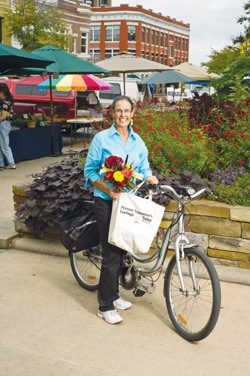Trash-Talking Mann
by October 15, 2012 12:00 am 420 views

Growing up in eastern Arkansas, Louise Mann was raised in a family that believed in leaving its environment a little nicer than it found it.
Now a Fayetteville resident, Mann still practices this philosophy. As the founder of Waste Reduction Resources LLC, she works with schools, businesses and local governments to educate people about recycling and reducing landfill waste. In nominating Mann, Mikel Lolley of the nonprofit Treadwell Institute called her a “real change agent.”
He wrote: “She really gets the long-term benefits of curb-sort programs and drop-off centers for connecting the consumer to what trash they generate and from that experience modifying their consumption habits.”
Mann was working as an elementary school teacher in Tennessee in 1988 when her career took a significant turn. She left the classroom to start a curriculum for volunteers that eventually grew into a park-like drop-off and educational center at Signal Mountain, near Chattanooga.
In 1993, she moved to Fayetteville with the hope of establishing similar centers throughout Arkansas.
While in the past, recycling was largely a volunteer-driven grassroots effort, Mann says today’s leader is industry. She has been working with companies like McKee Foods of Gentry to help them in their waste-reduction “journey.”
DaySpring Cards Inc., La-Z-Boy and Gates Rubber Co. are among other local firms pursuing zero-waste goals, she said.
Mann points to Wal-Mart Stores Inc., which started its own sustainability initiative in 2005, as the catalyst for this corporate movement.
Pointing out that not everything that’s collected is recycled, she stresses the need for accountability regarding where collected recyclables actually end up.
“Municipalities would be well-served to learn from Wal-Mart about accountability in their waste-reduction programs,” she said.
Mann’s currently on a mission to encourage Northwest Arkansas residents to help extend the life of the Tontitown landfill. Waste Management Inc., which operates the landfill, has said it expects a planned expansion to serve the region for another 14 years.
“If we all got serious and did everything we could to pull the 27 percent of organics [food and yard waste] out of our municipal waste stream, we could turn that 14 years into 40,” Mann said.
